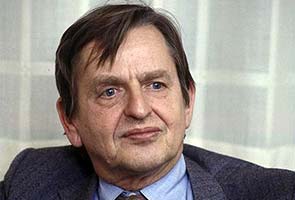29 aug 2012

Stockholm: The unsolved 1986 murder of Prime Minister
Olof Palme is front page news again in Sweden after newspapers published
excerpts of emails written by millionairess Eva Rausing before her
death saying she knew who was behind his killing.
Palme was gunned down as he walked along the pavement late on February 28 after a visit to the cinema in the centre of Stockholm with his wife. A petty criminal was found guilty of the crime in 1989 but was released later that year on appeal.
Rausing's emails have revived interest in a case which has long haunted Sweden and become a symbol of police incompetence.
Daily Aftonbladet led with the news on its
front page on Wednesday with a banner headline of "Rausing's mail about
the Palme Killing".
It described how Rausing, whose decomposed body was found hidden in her London home in July, said in the emails to a local journalist that the person who instigated the crime was a Swedish businessman.
The journalist, Gunnar Wall, who has written two books on the Palme's murder and who provided the emails to the Swedish media, declined to give Reuters the name of the man suspected by Rausing.
The mails were also found by British police on Rausing's computer, said Varg Gyllander, a spokesman for Sweden's National Criminal Police.
He said Kerstin Skarp, the prosecutor in charge of the ongoing investigation into Palme's death, had held a meeting with police on the case last week to discuss what to do.
The outcome of the meeting was secret, he said. "All information is taken seriously and investigated."
In a statement, Skarp said Rausing had contacted the Palme investigation and confirmed that Swedish authorities had received information from the British.
Wall said Rausing had written that she had got the name of the person suspected to be behind the crime from her husband, Hans Rausing, one of the heirs to the $10 billion Tetra Pak packaging fortune.
Wall contacted the prosecution authority after Rausing's death as she had said she feared for her life because of the information she was privy to.
"She was scared that she would be killed by the person she had identified," he said. "She said if she died in an unexpected way, she wanted me to look into it."
Rausing's husband was given a 10-month suspended jail sentence this month for preventing the lawful and decent burial of his wife, who had died two months before her body was discovered showing signs of cocaine and other drugs use.
Wall said Rausing had provided no evidence for her belief.
"It wasn't the kind of information which made me think, 'Here is the answer,' it was more that there could be something in it (which deserved to be looked at)," he said.
Many leads were investigated by police after the murder, including one that Kurdish separatists were responsible.
Other theories have included right-wing police officers, businessmen linked to weapons deals, the CIA intelligence agency, the South African apartheid government and the secret service of the former Yugoslavia.
Millionairess's mails revive interest in Swedish Prime Minister's 1986 murder case

File picture of Olof Palme Reuters
Palme was gunned down as he walked along the pavement late on February 28 after a visit to the cinema in the centre of Stockholm with his wife. A petty criminal was found guilty of the crime in 1989 but was released later that year on appeal.
Rausing's emails have revived interest in a case which has long haunted Sweden and become a symbol of police incompetence.
It described how Rausing, whose decomposed body was found hidden in her London home in July, said in the emails to a local journalist that the person who instigated the crime was a Swedish businessman.
The journalist, Gunnar Wall, who has written two books on the Palme's murder and who provided the emails to the Swedish media, declined to give Reuters the name of the man suspected by Rausing.
The mails were also found by British police on Rausing's computer, said Varg Gyllander, a spokesman for Sweden's National Criminal Police.
He said Kerstin Skarp, the prosecutor in charge of the ongoing investigation into Palme's death, had held a meeting with police on the case last week to discuss what to do.
The outcome of the meeting was secret, he said. "All information is taken seriously and investigated."
In a statement, Skarp said Rausing had contacted the Palme investigation and confirmed that Swedish authorities had received information from the British.
Wall said Rausing had written that she had got the name of the person suspected to be behind the crime from her husband, Hans Rausing, one of the heirs to the $10 billion Tetra Pak packaging fortune.
Wall contacted the prosecution authority after Rausing's death as she had said she feared for her life because of the information she was privy to.
"She was scared that she would be killed by the person she had identified," he said. "She said if she died in an unexpected way, she wanted me to look into it."
Rausing's husband was given a 10-month suspended jail sentence this month for preventing the lawful and decent burial of his wife, who had died two months before her body was discovered showing signs of cocaine and other drugs use.
Wall said Rausing had provided no evidence for her belief.
"It wasn't the kind of information which made me think, 'Here is the answer,' it was more that there could be something in it (which deserved to be looked at)," he said.
Many leads were investigated by police after the murder, including one that Kurdish separatists were responsible.
Other theories have included right-wing police officers, businessmen linked to weapons deals, the CIA intelligence agency, the South African apartheid government and the secret service of the former Yugoslavia.
No comments:
Post a Comment